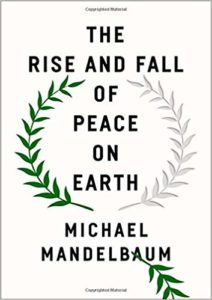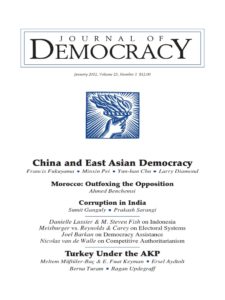 Greater attention to the preconditions for and impact of freedom and democracy, and to the persistence and varieties of nationalism, would contribute to the formulation of a 21st century foreign policy more suitable to U.S. interests and principles, according to a leading commentator.
Greater attention to the preconditions for and impact of freedom and democracy, and to the persistence and varieties of nationalism, would contribute to the formulation of a 21st century foreign policy more suitable to U.S. interests and principles, according to a leading commentator.
President George W. Bush’s November 2003 speech on the National Endowment for Democracy’s 20th anniversary marked a shift in focus from the threat posed by WMD to the threat posed by dictatorship, and from the goal of disarmament to that of promoting democracy, argues Peter Berkowitz, the Tad and Dianne Taube senior fellow at Stanford University’s Hoover Institution.
Michael Mandelbaum’s new book, “The Rise and Fall of Peace on Earth,” shows that while the spread of freedom and democracy has been very much to America’s advantage, the United States is poorly equipped to foster the cluster of norms, habits, and institutions on which they depend in the authoritarian states currently destabilizing the international order, he adds.
The “deep peace” of the post-Cold War era was marked by the steep decline of “security competition” — that is, the struggle for primacy among nations that has been a defining feature of international affairs since the dawn of history – is an unprecedented historical moment that rests on three pillars, according to Mandelbaum:
 First, “benign American hegemony” provided security and stability to the international order. Unlike hegemons of the past, the United States has not sought to conquer, occupy, or govern other nations. Its aim by and large has been to oppose aggression, stabilize regions, and preserve international order. When its military mission ended, it left, or retained bases with the agreement of the sovereign power.
First, “benign American hegemony” provided security and stability to the international order. Unlike hegemons of the past, the United States has not sought to conquer, occupy, or govern other nations. Its aim by and large has been to oppose aggression, stabilize regions, and preserve international order. When its military mission ended, it left, or retained bases with the agreement of the sovereign power.- Second, the dramatic growth in economic interdependence under America’s benign hegemony profoundly altered nations’ incentive structure. In the years following the end of the Cold War, the costs of armed conflict to international trade and cross-border investment greatly exceeded any benefits that could be obtained through the violent acquisition of treasure and territory.
- Third, and most importantly, the rapid spread during the last few decades of the 20thcentury of democracy — embracing both popular sovereignty and the protection of religious, political, and economic liberty — created conditions favorable to deep peace. “Democracy reduces the capacity for war by giving the public the means to check the sometimes-bellicose visions of their rulers,” argues Mandelbaum. “It also fosters a political culture of peaceful compromise.” Democracy doesn’t eliminate conflict, but democratic habits and institutions do nurture the belief that physical violence is the wrong way to resolve disputes and do foster the skills of negotiation and compromise.
But the rise of revisionist powers has ended the post-Cold War deep peace, notes Berkowitz.







